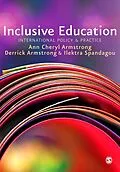What does inclusion really mean and what impact have inclusive approaches to education had on practice?
Bringing together issues of theory, research, policy and practice from both the countries of the South and the North, this ground-breaking book provides a critical discussion of recent developments in the field of inclusive education.
The authors consider developments, both in current thinking about the meaning of inclusion and in terms of policies and practices, in the context of education systems across the world and their differences and inter-relatedness. Topics covered include the increasing pressure on educators to develop a global policy agenda for inclusive education, the individual needs of children, the illusion of inclusivity and the importance of local contexts in determining policy. The book's international perspective illuminates common successes, failures and concerns.
With case studies from Europe, the Caribbean and Australasia, the book also features chapter summaries, questions to facilitate critical thinking and discussion, case studies and suggestions for further reading.
An essential read for anyone studying inclusive education, special educational needs, disability studies, social policy and international and comparative education, this book will ignite debate and enable the reader to develop a deep understanding of the issues.
Ann Cheryl Armstrong is the Director of the Division of Professional Learning, Derrick Armstrong is Acting Deputy Vice Chancellor (Education) and Professor of Education and Ilektra Spandagou is a Lecturer in Inclusive Education. They are all based at the University of Sydney, Australia.
Autorentext
Ann Cheryl Armstrong PhD is Director of the Division of Professional Learning in the Faculty of Education and Social Work, at the University of Sydney. A former primary school teacher, Ann Cheryl has worked in education and professional development for 23 years and has extensive experience as a teacher, teacher educator, research manager, project manager and programme leader. She has worked in countries throughout the Caribbean as well as in the UK and Australia. Before emigrating to Sydney in February 2005, she was employed with the University of Sheffield, UK in the School of Education as Director of the Caribbean Distance Education Programme. In this role, she played a major part in establishing a programme of advanced teacher education by distance learning with pathways from post-graduate Certificate and Diploma, through to Masters and Doctoral levels.
Inhalt
PART ONE: HISTORY, SOCIAL CONTEXT AND KEY IDEAS
Inclusive Education: Key Themes
The Social History of Inclusion
The Current State of Inclusive Education: Contradictions and Concerns
PART TWO: POLICY CASE STUDIES
Globalization: Internationalization of Inclusive Education
The Impact of International Agencies on Inclusive Policies
The European Union: A Common Policy on Inclusion?
PART THREE: FROM POLICY TO PRACTICE
Making Inclusion Special: A Case Study of English Policy Contradictions
From Policy to Practice: Defining Inclusion in Schools
Exporting Inclusion to the Developing World
PART FOUR: CONCLUSIONS AND REFLECTIONS
A conclusion or a Starting Point for the Future?
An Epilogue on Reflection
